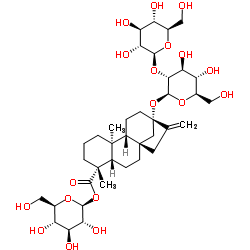Stevioside enhances satellite cell activation by inhibiting of NF-κB signaling pathway in regenerating muscle after cardiotoxin-induced injury.
Tipwadee Bunprajun, Tossaporn Yimlamai, Sunhapas Soodvilai, Chatchai Muanprasat, Varanuj Chatsudthipong
文献索引:J. Agric. Food Chem. 60(11) , 2844-51, (2012)
全文:HTML全文
摘要
Stevioside, a noncaloric sweetener isolated from Stevia rebaudiana, exhibits anti-inflammatory and immunomodulatory effects through interference of nuclear factor (NF)-kappa B pathway. We investigated whether this anti-inflammatory property of stevioside could improve muscle regeneration following cardiotoxin-induced muscle injury. Adult male Wistar rats received stevioside orally at an accepted daily dosage of 10 mg kg⁻¹ for 7 days before cardiotoxin injection at the tibialis anterior (TA) muscle of the right hindlimb (the left hindlimb served as control), and stevioside administration was continued for 3 and 7 days. TA muscle was examined at days 3 and 7 postinjury. Although stevioside treatment had no significant effect in enhancing muscle regeneration as indicated by the absence of decreased muscle inflammation or improved myofibrillar protein content compared with vehicle treated injured group at day 7 postinjury, the number of MyoD-positive nuclei were increased (P < 0.05), with a corresponding decrease in NF-κB nuclear translocation (P < 0.05). This is the first study to demonstrate that stevioside could enhance satellite cell activation by modulation of the NF-κB signaling pathway in regenerating muscle following injury. Thus, stevioside may be beneficial as a dietary supplementation for promoting muscle recovery from injury. However, its pharmacological effect on muscle function recovery warrants further investigation.
相关化合物
| 结构式 | 名称/CAS号 | 分子式 | 全部文献 |
|---|---|---|---|
 |
甜菊苷
CAS:57817-89-7 |
C38H60O18 |
|
[Identification and biotransformation properties of a bacter...
2011-01-01 [Wei Sheng Wu Xue Bao 51(1) , 43-9, (2011)] |
|
Structures of the novel α-glucosyl linked diterpene glycosid...
2011-09-27 [Carbohydr. Res. 346(13) , 2034-8, (2011)] |
|
Mass production of rubusoside using a novel stevioside-speci...
2012-06-20 [J. Agric. Food Chem. 60(24) , 6210-6, (2012)] |
|
Diterpene glycosides from Stevia rebaudiana.
2011-01-01 [Molecules 16(5) , 3552-62, (2011)] |
|
Synthesis and sensory evaluation of ent-kaurane diterpene gl...
2012-01-01 [Molecules 17(8) , 8908-16, (2012)] |